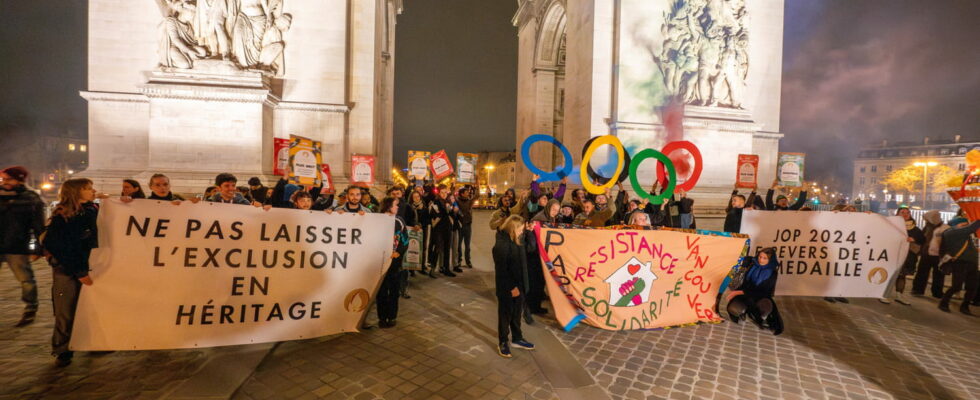According to the associative collective Le Revers de la miel, more than 12,000 expulsions of “people in very precarious situations” were ordered between May 2023 and April 2024.
12,545. This is the number of people in precarious situations who were expelled from Île-de-France in the run-up to the Paris 2024 Olympic Games (JO). A figure made public this Monday, June 3, in a collective report The other side of the coin, which brings together more than 80 associations helping the most vulnerable people. Under “pressure” from the organization of the Olympic Games, the Paris region was “emptied of some of its most precarious inhabitants”, regrets the collective.
A “social cleansing before the Olympics”
Between May 1, 2023 and April 30, 2024, no less than 12,545 people were expelled, mainly migrants. An increase of 38.5% in one year according to figures from the Observatory of evictions from informal living spaces. “It’s huge and it shows in a documented way the social cleansing before the Olympics” denounces Paul Alauzy, coordinator at Doctors of the World and spokesperson for the collective in the columns of franceinfo. The collective speaks in particular of an “intensification” of “expulsions from street camps of exiled people” and the desire to “invisibilize” poverty.
On the other hand, according to figures from the prefecture of the Île-de-France region, relayed by franceinfo, over the period 2023-2024, 5,224 people were expelled. 3,958 last year, and 1,266 since the start of 2024. That is to say a considerable difference with the information revealed by the collective The other side of the coin this Monday, June 3. The collective rightly highlights “16 operations in four months at the end of 2023, i.e. half of the expulsions for the year and 26 operations in the first five months of 2024, i.e. almost as many as for the whole of 2022”.
Evictions in Île-de-France and regions
Those expelled are now dispersed outside Île-de-France to be received in temporary regional reception centers, created in March 2023, for a maximum period of three weeks with a promise of lasting accommodation. . The collective sees this as displacement without “truly free and informed” consent and deplores the “virtually non-existence” of social diagnosis before expulsions. In addition, he fears that the “security perimeters and devices” and “the significant police presence” will make “the public space increasingly inhospitable for people in very precarious situations, and sometimes staying illegally”.
A situation which does not exclusively concern the Paris region. Indeed, the report identifies “other cities hosting certain events”. The Observatory of evictions from informal living spaces mentions in particular the eviction from a slum in Bordeaux at the end of March. Nearly 500 people stayed there, close to the Matmut Atlantique stadium. Same observation in Lille, mid-May, in the Parc Matisse slum inhabited by 60 people.
“Dehumanization” and “lack of consideration”
At the same time, The other side of the coin deplores the “harassment” and “repeated administrative checks” of sex workers, to “keep them away from public spaces”. “Numerous expulsions” were also noted by the association Aids, which manages a reception and risk reduction support center for drug users (CAARUD) near Les Halles in Paris. Combined actions, in France and in the regions, which contribute to “dehumanization” and “a lack of consideration of individual situations” for the collective.
